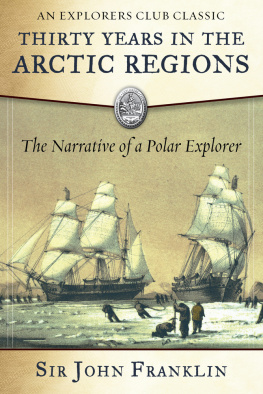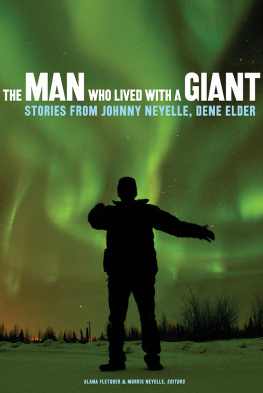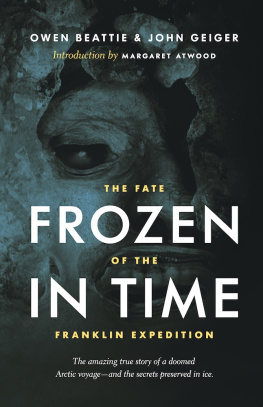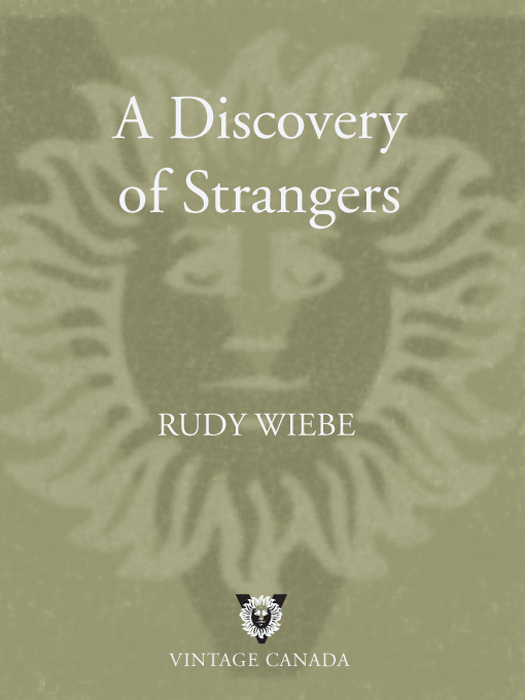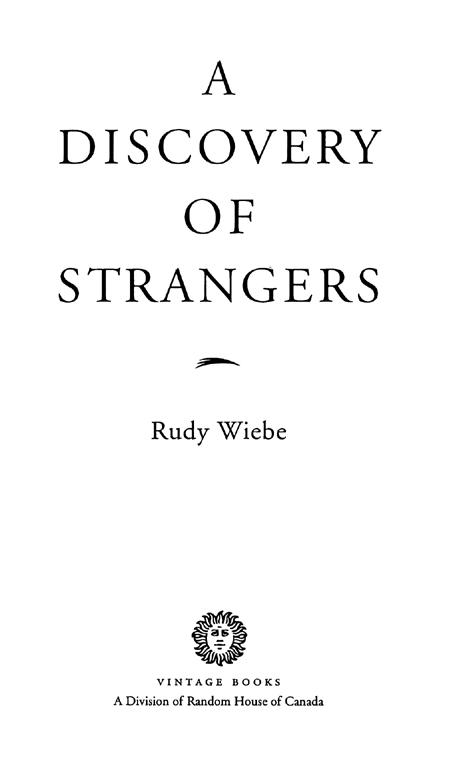A DISCOVERY OF STRANGERS
Winner of the Governor Generals Award for Fiction
The National Bestseller
Wiebe lives up to status of literary icon. Wiebe has told a powerful story with passion and verve. He has written a haunting book, one worthy of the vast and desolate land, and the courageous people, white and Yellowknife, to which it pays homage.
The Gazette (Montreal)
Gripping Wiebe has created a powerful, dreamlike narrative of a society profoundly shattered by the arrival of Europeans. Fascinating.
The Toronto Star
A major work of art Wiebe provides some of the most evocative prose yet about the Canadian North.
Macleans
Beautiful fascinating [ADiscovery of Strangers is] a pleasure of the first order.
Josef Skvorecky
On a rich and broad canvas, Wiebe paints his characters with penetrating insight. This memorable novel will add to the authors reputation as one of Canadas most gifted writers peerless delineator of his countrys history and soul.
The Canadian Jewish News
[A] poetically charged work that resonates long after the book is closed.
The Edmonton Journal
Wiebe is able to be both Faulkner and Balzac. [He] can construct scenes of painstaking detail and psychological insight. Exciting and unpredictable vintage Wiebe.
Books in Canada
ALSO BY RUDY WIEBE
Fiction
Peace Shall Destroy Many (1962)
First and Vital Candle(1966)
The Blue Mountains of China (1970)
The Temptations of Big Bear (1973)
Where Is the Voice Coming From? (1974)
The Scorched-Wood People (1977)
Alberta/A Celebration (1979)
The Mad Trapper (1980)
The Angel of the Tar Sands (1982)
My Lovely Enemy (1983)
Chinook Christmas (1992)
River of Stone: Fictions and Memories (1995)
Sweeter Than All the World (2001)
Non-Fiction
A Voice in the Land (ed. by W. J. Keith) (1981)
War in the West: Voices of the1885Rebellion (with Bob Beal) (1985)
Playing Dead: A Contemplation Concerning the Arctic (1989)
Stolen Life: The Journey of a Cree Woman (with Yvonne Johnson) (1998)
Drama
Far as the Eye Can See (with Theatre Passe Muraille) (1977)
Rudy Wiebe, widely published internationally and winner of numerous awards, including two Governor Generals Awards, is the author of nine novels, four short-story collections, three books of essays and Stolen Life: The Journey of a Cree Woman, which he co-authored with Yvonne Johnson. Rudy Wiebe is an Officer of the Order of Canada, and lives in Edmonton.
VINTAGE BOOKS CANADA EDITION, 1995
Copyright 1994 by Jackpine House Ltd.
All rights reserved under International and Pan American Copyright Conventions. Published in Canada in 1995 by Vintage Books, a division of Random House of Canada Limited, Toronto. First published in Canada by Alfred A. Knopf Canada in 1994. Distributed by Random House of Canada Limited, Toronto.
Canadian Cataloguing in Publication Data
Wiebe, Rudy, 1934
A discovery of strangers
eISBN: 978-0-307-36714-3
1. Indians of North America - First contact with Europeans - Fiction.
2. Franklin, John, Sir, 1786 - 1847 - Fiction.
3. Arctic regions - Discovery and exploration - British - Fiction.
4. Northwest Passage - Fiction.
I. Title.
PS8545.I38D57 1995 C813.54 C94-932384-5
PR9199.3.W54D57 1995
Detail from a painting by Toni Onley, Untitled, 1958
From the collection of Jessica and Percy Waxer
v3.1
Strangely I heard a stranger say,
I am with you.
RAINER MARIA RILKE
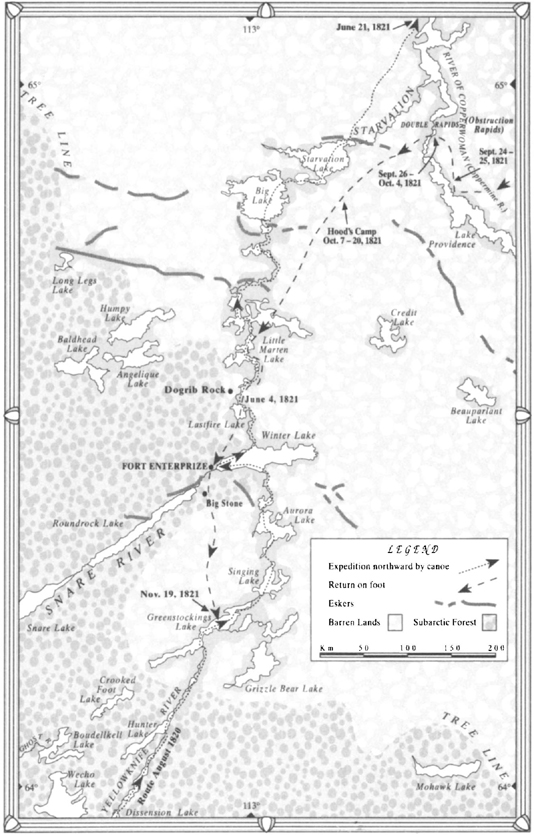
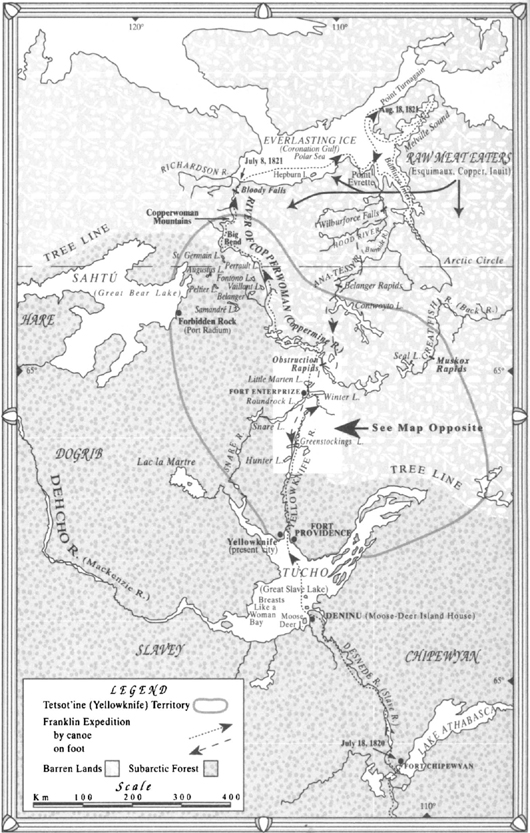
Prefatory Note
The dated selections between chapters are quoted (some with minor rearrangements) from the journals kept by Robert Hood (17971821)and John Richardson (17871865)during the first Franklin overland expedition(1819-1822)to the Arctic coast of what is today Canada.
A DISCOVERY OF STRANGERS

1
T HE A NIMALS IN T HIS C OUNTRY

The land is so long, and the people travelling in it so few, the curious animals barely notice them from one lifetime to the next. The human beings whose name is Tetsotine live here with great care, their feet travelling year after year those paths where the animals can easily avoid them if they want to, or follow, or circle back ahead to watch them with little danger. Therefore, when the first one or two Whites appeared in this country, an animal would have had to search for four lifetimes to find them being paddled about, or walking, or bent and staggering, somewhere on the inexorable land.
About that time some of the animals did begin to hear strange noises, bits of shriek and hammer above the wavering roar of rapids or the steady flagellation of wind. These were strangers, so different, so blatantly loud the caribou themselves could not help hearing them long before they needed to be smelled, and some animals drifted around to see what made the trees in one place scream and smash that way, the rocks clang. They noticed creatures that looked like humans standing motionless here and there, abruptly pointing and shrieking, pounding! pounding! scuttling about all day and sometimes at night as well, when tendrils of bush along the river might spring up suddenly into terrifying flame. And the animals understood then that such brutal hiss and clangour must bring on a winter even colder than usual.
And shortly after, when wind hammered the snow hard as folded rock under the thickest trees, and growing ice choked the rapids into silence, they knew that of course they had been right. Then an erratic cracking open, or a tree splitting, could be heard so far it seemed they were alert to every sound happening anywhere in the world, and the racket these strange human beings made in one place mattered nothing at all. The animals simply moved away into their necessary silence, travelling where they pleased, as they always had inside that clenched fist of the long darkness, their powerful feathered, furred bodies as light as flecks of ice sifting over snow, as light and quick as breathing.
But throughout the dark weight of midwinter, with moss and lichens always harder to smell and paw from under the crusted snow, all the caribou knew that the sun would certainly return again. And eventually it did; its rim grew slowly day by day up out of darkness into red brilliance, until finally the cows and calves recognized themselves together as they always were, in the whole giant ball of it shimmering through ice fog, round and complete again on the distant edge of the sky. The cows lay in their hollows of snow on a drifted lake, their calves from the previous spring sheltered against their backs out of the wind. Their blunt, furry noses lifted from the angles of their folded legs, their nostrils opened to the burning air: it was sharp as ice, gentle with all the smells they recognized, arctic and safe. Lying safe, alert in this instant of rest, they were reassured that when that blazing sun stands three times its height over the glazed levels of this lake, they will feel the restlessness of their young grow heavier within them. And then they will move again into their continual travel.



